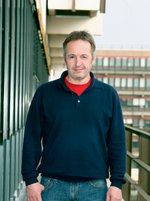
Biomedical Science
The Main Research Area of Biomedical Sciences connects basic research in the natural sciences at the University of Duisburg-Essen (UDE) with applicationoriented medical research at University Hospital Essen. It encompasses the Centre for Medical Biotechnology and the Erwin L. Hahn Institute for Magnetic Resonance Imaging (see page 78).
The Centre for Medical Biotechnology (ZMB) is an interdisciplinary scientific centre of the UDE integrating medical research at University Hospital Essen and natural sciences on campus.
The 55 working groups within the ZMB are active in biomedical research and are organized in four research programmes:
- Oncology
- Immunology, Infectious Diseases and Transplantation
- Genetics, Developmental, Molecular and Cell Biology
- Biomolecular Structure and Function.
The interdisciplinary approach, which combines techniques from (bio)chemistry, genetics, computational life science and medicine, as well as structural biology and imaging techniques, provides the opportunity to investigate pathological processes at all stages, from gene to protein to cell all the way up to the living model organism, and ultimately in the patient.
This research focus is complemented by the Erwin L. Hahn Institute for Magnetic Resonance Imaging, where an international team of engineers, natural scientists and medical doctors work together. One of its main aims is to apply the advantages of high-field MRI to the entire human body with its developments and to promote the spread of high-field MRI technology.
The wide range of established, state-of-the-art methods and expertise available here enable the scientists in the Main Research Area of Biomedical Sciences to understand the mechanisms of disease on the molecular level and use biotechnology to influence the relevant processes.
In 2011, four joint professorships were established at the ZMB, two of which belong to the Faculty of Biology and two to the Faculty of Medicine. They support not only research at the ZMB, but also training and education within the interdisciplinary Medical Biology degree programme.
The first joint professorship was accepted by Professor Markus Kaiser in 2010. He heads the Department of Chemical Biology in the Faculty of Biology. His work group synthesizes low molecular weight bioactive chemical compounds to control cellular processes. The molecules they develop can be applied not only in basic biomedical research but also as active substances for medical applications, for example in treating cancer or neurodegenerative diseases.
Professor Matthias Gunzer took up the second of the professorships in the Medical Faculty in 2011. He heads the Institute for Experimental Immunology and Imaging as well as the Imaging Center at University Hospital Essen. As joint professor, he also has a laboratory at the ZMB on the Essen campus. His research group focuses on the characterization of the behavioural dynamics of immune cells. Central topics include mobilization of these cells from the sites of formation, their functional activity, their movement patterns under various conditions, and the formation of cell-cell interactions during the immune response in vivo. Highly specialized imaging techniques are used to investigate these topics, such as intravital two-photon microscopy. This technique allows immunological processes to be studied in the living organism and visualizes the functions of immune cells, for example, in important organs such as the lymph nodes, bone marrow, brain and lungs. Two additional joint professorships will follow in 2012.
The success of the research has led to the acquisition of further funding for collaborative projects in the past two years.
With the help of its coordinator, Professor Verena Jendrossek, the DFG Research Training Group “Molecular Determinants of the Cellular Radiation Response and their Potential for Response Modulation” (GRK 1739) was granted funding in 2011. This collaborative project, initially funded for four and a half years, aims to identify molecules that determine the cellular reaction to ionizing radiation and could thus potentially serve as new therapeutic target structures: how is the cell’s reaction to radiation determined on the molecular level, what changes in tumour cells lead to resistance to radiation, and can the effects of radiation be influenced by a targeted modulation of cellular signalling processes? This multidisciplinary project aims to create the molecular basis for development of effective strategies for improving radiation therapy, which is one of the most important and most effective therapy options available for fighting cancer.
Professor Ann Ehrenhofer-Murray is the coordinator for the DFG Research Training Group “Transcription, Chromatin Structure and DNA Repair in Development and Differentiation” (GRK 1431). After a highly successful first funding phase, funding was extended in 2011 for a further four and a half years. This GRK brings together research expertise in the fields of chromatin research and gene regulation. Scientists from the Faculties of Biology and Medicine at the UDE work together to understand how cells organize and read genetic information (DNA) and how differences in this regulation lead to the development of individual cell types and organs within an organism.
Three Priority Programmes in which ZMB researchers are involved also received DFG funding, each for a period of three years. These programmes are SPP 1365 “The Regulatory and Functional Network of Ubiquitin Family Proteins”, which was extended in 2011, and two new projects secured in 2010, SPP 1464 “Principles and Evolution of Actin-Nucleator Complexes”, and SPP 1468 “ Osteoimmunology - IMMUNOBONE – A Program to Unravel the Mutual Interactions between the Immune System and Bone”.
An exclusive mentoring programme for doctoral students was established in 2011, for which five Nobel Laureates from the fields of chemistry and medicine were secured as guest professors; each year, the professors select doctoral students to mentor, and they hold lectures at the UDE. The mentoring programme is an excellent opportunity for the students to communicate one-on-one with highly experienced and successful scientists. The programme is supported by Professor Robert Huber (Nobel Prize 1988), Professor Harald zur Hausen (Nobel Prize 2008), Professor Jean-Marie Lehn (Nobel Prize 1987), Professor Erwin Neher (Nobel Prize 1991) and Professor Kurt Wüthrich (Nobel Prize 2002).

